Victorians turn out in force for Anzac Day
Victorians have turned out in force to recognise the sacrifice of our servicemen and women, with 50,000 flocking to the Shrine of Remembrance for “an incredibly special” Anzac Day.
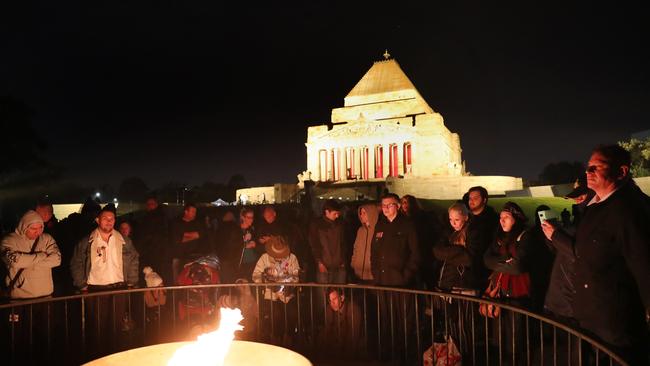
Victoria
Don't miss out on the headlines from Victoria. Followed categories will be added to My News.
After two years of limited Anzac Day services and marches, hundreds of thousands of Australians have turned out at Dawn Services across the nation.
Fifty thousand Victorians huddled in the cold at Melbourne’s Shrine of Remembrance on Monday to acknowledge and remember Australian servicemen and women for the first time since 2019.
Governor of Victoria Linda Dessau told the crowd the Shrine of Remembrance “is the living soul of Melbourne.”
“All those who have served, or who are serving, are the reason that we gather on this holy ground,” she said.
“We cannot change the past. We cannot bring back those lost to the traumas of conflict. We can only support those who did return. We can only honour and remember those who did not.
“That is the purpose of this place of pilgrimage, this Shrine of Remembrance, this part of home that never forgets those who served. Its purpose is to honour and remember. And, in doing so, to understand the terrible cost of war.”
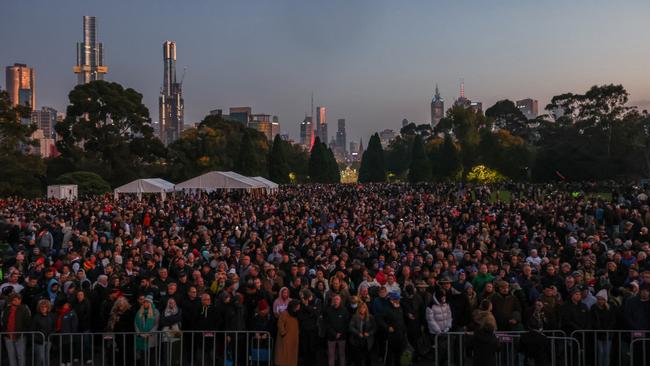
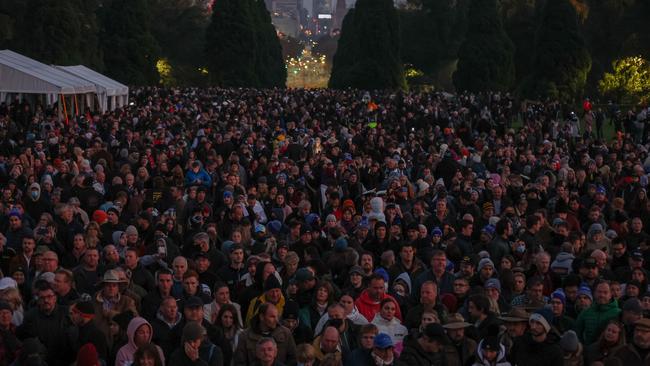
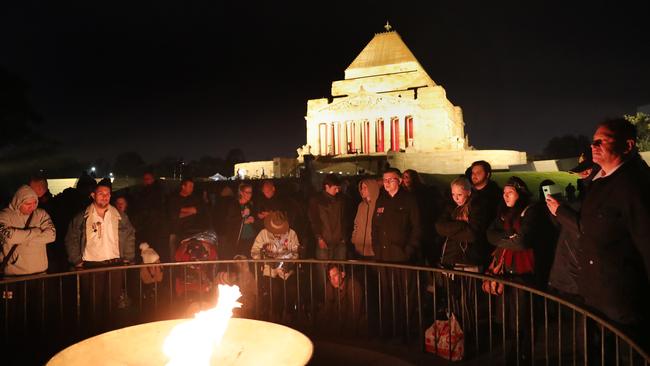
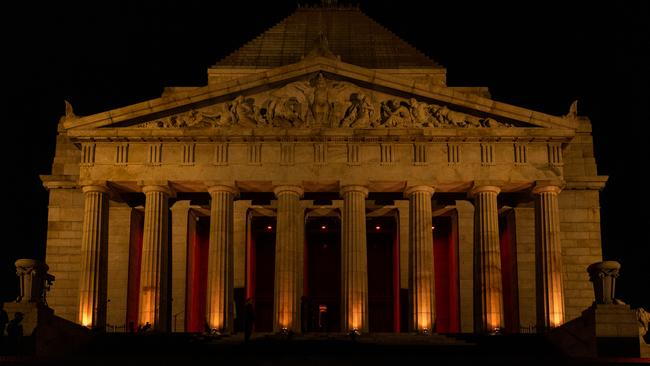
WATCH MELBOURNE’S DAWN SERVICE
Siblings Chris and Annie Oeding flew down from Perth to attend the service, and have been observing Anzac Day since they were children.
“Our father, Terrence John Oeding, served in Bougainville, New Guinea,” Mr Oeding said.
“It was just overwhelming, the respect and the silence that everybody maintains.”
“Our father always encouraged us to attend the dawn service,” Annie Oeding said.
“As we grew older, we realised the sacrifices they made were for the life we now have.”
Chris’s wife, Jan, said many of her relatives were Australian service men and women.
Her grandfather was one of the first people who saw the Japanese submarines in Sydney Harbour.
“It’s such a special occasion, it brings together all walks of life,” she said.
The couple organised a local service on their street last year due to Covid restrictions preventing them from attending a formal service.
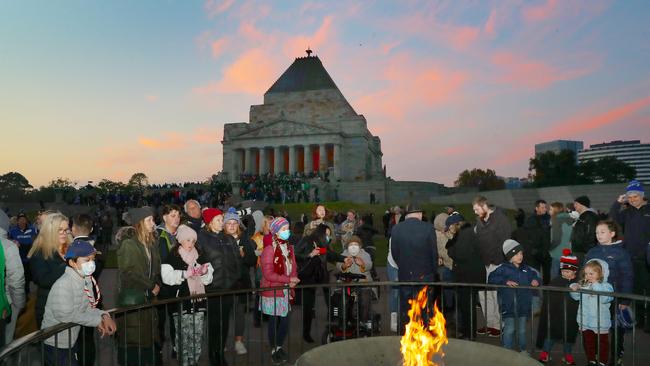
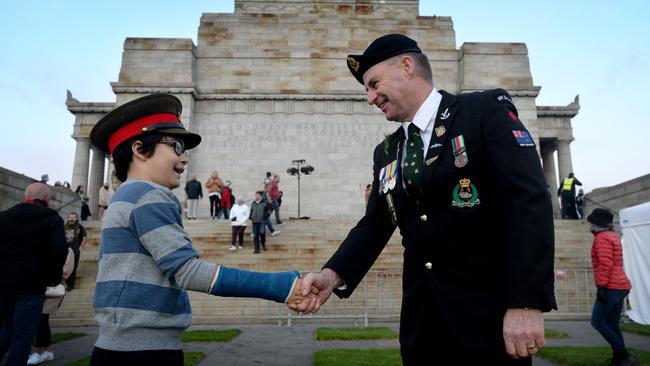
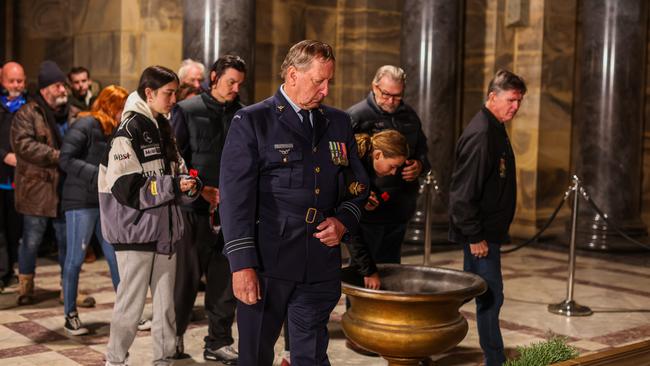
RSL Victoria president Robert Webster said this year’s Dawn Service was “very significant” after two years of interruptions due to the Covid pandemic.
“This is the first time we’ve been able to do it unrestricted for three years,’’ he said.
“There will be a lot of people that will come out because of that principle.’’
At Gallipoli, a smaller than usual gathering of several hundred people will gather to honour the Anzacs.
Fans flock to Anzac Day clash at the ’G
Tens of thousands of fans packed out the MCG for the traditional Anzac Day clash between Collingwood and Essendon.
The blockbuster match drew 84,205 fans, up from last year’s attendance of 78,000. The highest Anzac Day crowd of 93,373 was set in 2013.
An unfamiliar quietness swept the crowded stadium when a minute’s silence was observed before kick-off in respect of those who had served.
Empty seats were few and far between, with many veterans spotted in the crowd still wearing military insignia from Anzac services earlier in the day.
The Anzac Day motorcade parade returned to The MCG this year, giving footy fans the chance to acknowledge the sacrifices of past and current servicemen and women.
The Ode of Remembrance and Last Post was played to the animated audience during the pre-match observance ceremony, while the Essendon and Collingwood teams ran through a joint banner as a symbol of unity.
Many fans wore Anzac Day appeal badges on their jerseys out of respects for the diggers.
Veterans’ proud Anzac Day march
Victorians turned out in force to show their support to veterans and serving defence force members as they marched towards the Shrine of Rememberance during the Anzac Day Parade.
A constant thunder of applause from onlookers rang out across St Kilda Road as ex-servicemen and women, from WWII to Afghanistan, were cheered on.
Kevin Rother, who migrated to Australia after serving in the South African Defence Force, said he was astonished by the turnout.
“It’s always special, it sends a shiver down your spine and I’m grateful to see the crowds,” he said.
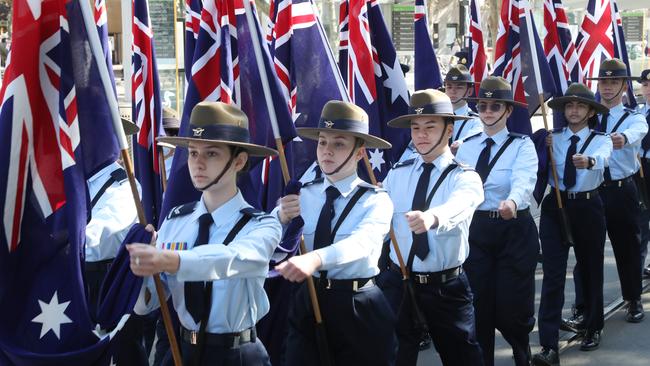
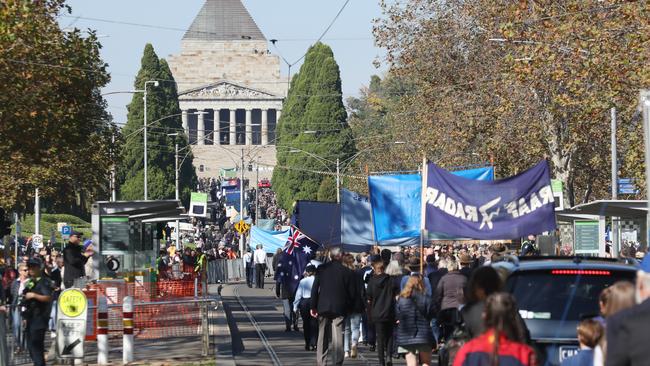
“I’m marching for myself and my grandfather who fought in WWII, it’s important we remember the sacrifices that were made.”
Taylor Jones made the trip down from Wangaratta with his young family for the parade and said it was a “good day”.
“My grandfather served in WWII, he’s still marching and he’s 96 so it’s important for me to show support,” he said.
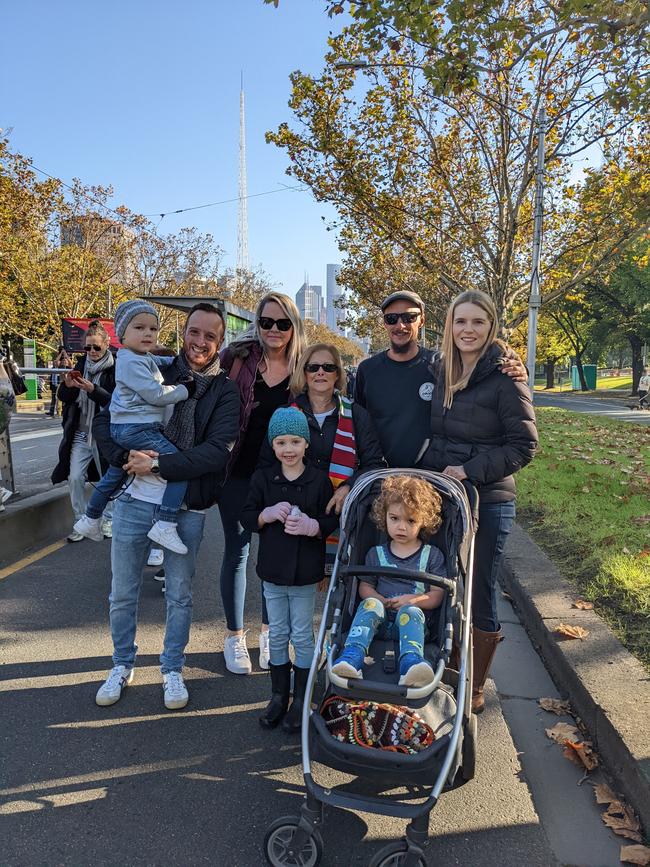
Thousands of people lined St Kilda Rd from 9am as veterans and their family members marched in the Melbourne sunshine.
Pauline Prendergast was one of those in the crowd as her husband, Michael, a Vietnam veteran, marched.
Michael and Pauline were dating as teenagers but broke up shortly before he was conscripted at the age of 19.
Pauline continued to write to him while he was in Vietnam and when he came back to Australia Michael called her up.
They were married a year later and went on to have six children and 13 grandkids, with another on the way.
“Most of them never talked about the war,” Ms Prendergast said.
“When they first came back they marched in Brisbane, he could never forget it, people spat on them. And he never wanted to go to war, he was 19 when he was called up and he had his 21st birthday in Vietnam.”
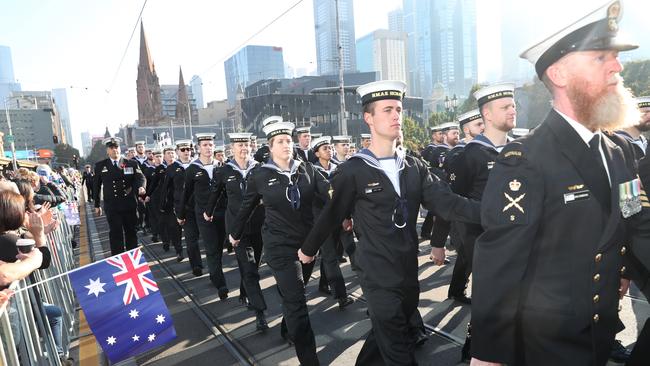
Michael struggled with PTSD in the years after his return to Australia. He and Pauline both went on to receive counselling through the Veterans Association.
“We’ve had a lot of suicides in our age group,” she said.
“It needs to be talked about, all returning troops need support when they come back and the opportunity to debrief.”
Four of their children and seven of their grandkids came to support Michael during the march today.
“It’s beautiful that everyone comes to appreciate all the veterans have done from every war, because it really changed their lives.”
‘We can only imagine what was in their heads’
About 4000 people gathered for the Dawn Service at Ballarat Cenotaph, where the Australian martial virtues of courage, mateship, and sacrifice were emphasised.
“We’re assembled here this morning to again honour the memories of the people and the sacrifices they made in service of our nation,” radio presenter Brett Macdonald told the crowd.
“Anzac Day goes beyond the anniversary of the landing on Gallipoli in 1915: it’s the day on which we remember all Australians who served and died in war and on operational service.”
He said the values embodied by 20th century Diggers continued to inform the country’s identity.
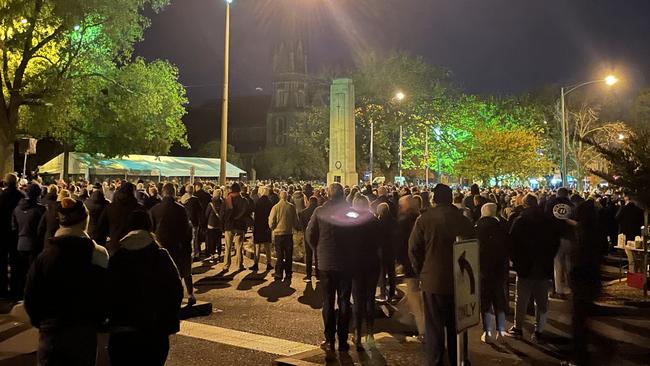
Ballarat Anglican Bishop Garry Weatherill said a prayer during the service and invoked the sacrifice of soldiers in Australia’s wars to call for the continual expression of “freedom and humanity”.
“On this hour, on this day, in this month 107 years ago, the first Anzacs landed at Gallipoli,” he said.
“We can probably only imagine what was in their heads and in their hearts: excitement, fear, thoughts of home, thoughts of parents and siblings, of girlfriends, thoughts of the future.
“All of that though was put aside as they came to this momentous landing which we gather to honour today.”
PM’s tribute to Ukraine in Anzac Day address
Prime Minister Scott Morrison has spoken of the dangers of war still troubling the world at the Dawn Service in Darwin
The Prime Minister said it was important to learn from the past as he made reference to the ongoing war in Ukraine and the “troubling” situation plaguing the region with China’s control.
“As (the late) Clive James said on Anzac Day a long time ago, the memory of past sacrifice … he said precisely because we’ve got the world our parents dreamed of, and I would say fought for,” Mr Morrison said.
“But our world is changing. War does strike Europe. Coercion troubles our region once more. An arc of autocracy is challenging the rules based order our grandparents had secured.”
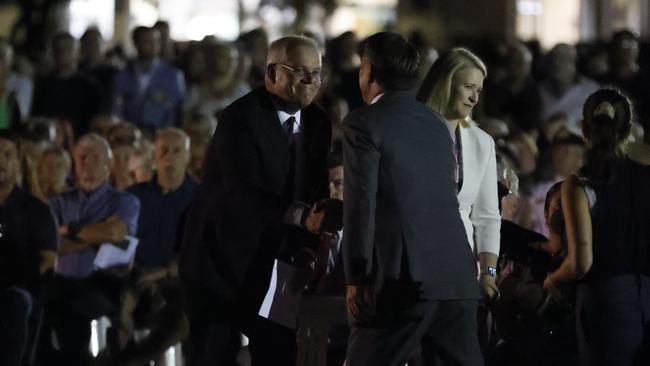
Deputy opposition leader Richard Marles, also in attendance, echoed the Prime Minister’s sentiment, asking those gathered to keep Ukrainians in their thoughts and prayers.
Mr Marles paid particular mention to the city of Darwin, where “war first met Australia 80 years ago”.
“Around us more than 230 people died in the bombing of Darwin,” he said.
“And right behind me, is the final resting place for 80 Americans. We are deeply grateful,” he said.
Crowds to flock to ’G
It comes as the captains of the football clubs that will draw masses of fans to the MCG on Monday say they feel honoured to play on Anzac Day.
A crowd of about 90,000 is expected at the Essendon-Collingwood showdown as players and fans gather in a uniquely Melbourne way to acknowledge and celebrate the Anzac spirit.
While he has played on the big stage often before, Magpies captain Scott Pendlebury said standing in front of a packed MCG for the Anzac Day service was “unbelievable’’.
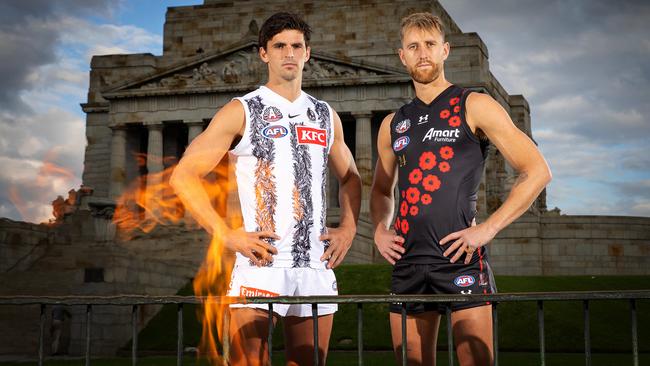
“I always say, ‘listen to that Last Post when everyone’s silent and take a moment to look around and appreciate what you’re about to go and do, and how lucky we are to do it on such a special day for the country’,’’ he said.
Bombers skipper Dyson Heppell said some of his fondest memories came on Anzac Day.
“A hundred thousand people dead silent, it’s just a ridiculous feeling,’’ he said. “Something you can’t even describe. It’s very special.”
Magpies recruit Pat Lipinski said one of the first things the club mentioned when he signed was, ‘Oh, you get to play Anzac Day’.
“It’s the biggest game of the regular season, so super exciting,’’ he said.
Band of brothers’ pride in service
The drive to serve the nation runs deep and proud in the Wells family.
More than 50 years since volunteering to fight in Vietnam, the four brothers from Melbourne still feel honoured to have worn their country’s uniform.
John Wells, 76, was the eldest to join the war as a signaller in the artillery regiment in 1967.
“We were proud to volunteer and two-thirds of all who fought in Vietnam were volunteers although you tend to hear a lot about nashos (national service conscripts),” he said.
But when in the war zone, those distinctions washed away. “It was more about the type of person you were, not how you joined the army.”
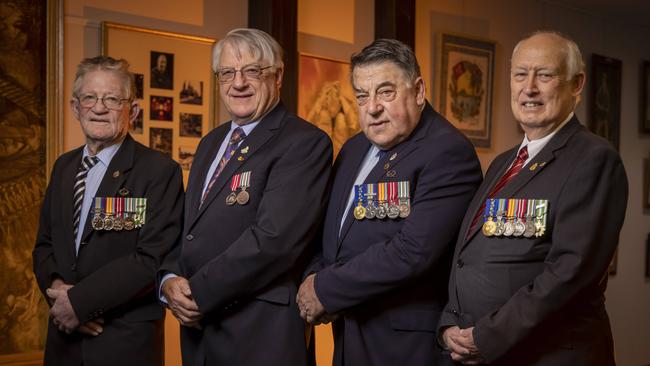
John was followed two years later by stepbrother Simon Bloomer, now 74, who served as a postal clerk in the service corps but the vagaries of war meant he saw more action of any of the brothers, John says.
Andrew Wells, 72 arrived in Vietnam in 1970 as an infantryman while David, 71, was due to fly out in 1972 but broke his leg playing rugby.
On Anzac Day the four brothers will gather at Dandenong RSL, where John is president, to reflect and swap stories with men from both sides of the former battle lines.


